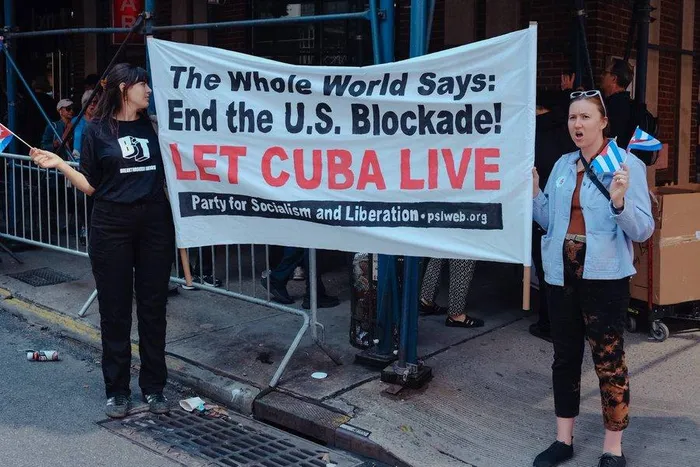US blockade or not, Cuba remains a beacon of hope for other nations

The blockade of Cuba is the main pillar of the US strategy of maximum pressure against Cuba, intended to suffocate the economy, generate shortages and discontent in order to provoke a social outbreak, says the author.
Image: SUPPLIED
MOST Cubans have now been born in the midst of an economic war imposed by a powerful nation like the United States. The Cuban people have had to pay a steep price to enjoy an international and unquestionable principle: the right to develop with independence, sovereignty, and self-determination.
After more than 60 years of continued aggression and interference from the US, is it possible to measure in numbers the pain of an individual, a family, or a country? Is it possible to measure to what extent a country's unilateral policy affects another nation? Probably not, but examples of daily life hardship are there as a testimony of the resilience of a nation, of a people willing to strive for a better future no matter the obstacle they face.
The economic, commercial and financial blockade imposed by the United States government against Cuba constitutes a unilateral, coercive and extraterritorial policy that violates international law and undermines the Cuban people's human rights.
The blockade is the main pillar of the US strategy of maximum pressure against Cuba, intended to suffocate the economy, generate shortages and discontent in order to provoke a social outbreak that would ultimately lead to a change in the constitutional order legitimately established by the Cuban people in the exercise of their self-determination.
This criminal policy dates back to April 6, 1960, when the then Deputy Assistant Secretary of State, Lester Mallory, stated that: “every possible means should be undertaken promptly to weaken the economic life of Cuba a line of action which, while as adroit and inconspicuous as possible, makes the greatest inroads in denying money and supplies to Cuba, to decrease monetary and real wages, to bring about hunger, desperation and the overthrow of government.”
Even though they have stubbornly and repeatedly enacted this policy, it hasn´t achieved its strategic goal in over 60 years, but it has had a deep impact on Cuba’s economy, affecting the procurement of food, medicine, fuels, and it has provoked power outages, lack of transportation, and the deterioration of other basic services for the Cuban people.
To best demonstrate this, let's visualise the reality of not having the blockade and what life could be in my country. Research has proven that:
Two hours without this policy in place could represent the total expenditure of Cuba's medicine imports used for the treatment of psychiatric, neurological, and heart conditions;
- Five hours could be enough to supply all the teaching aids needed in all daycare centers of the country;
- 14 hours of no blockade would mean that all Cuban with diabetes could have access to the insulin needed for a whole year;
- Two days without blockade would be equivalent to the annual cost of maintenance required for the public transportation system in the country;
- and 14 days can be sufficient to finance an investment to use up to 26% of renewable energy to supply the power grid.
The list is long and goes on. One can easily conclude that the prevailing challenges in Cuba could be more readily surmounted if the nation had access to the substantial resources that are currently withheld from it by the blockade. The total damages sum more than one trillion US dollars, which translates into 13.8 million US dollars of daily losses.
Only from March 1, 2024 to February 28, 2025, the losses were estimated at seven billion US dollars, which represents a 49% increase as compared to the previous year.
These figures are overwhelming, but the human cost is boundless. No other nation in the world has been forced to undertake a social and development system under such conditions of prolonged systematic hostility.
The effects of this war on the Cuban economy, society, daily life and dreams of progress of millions of Cubans have been without a single day’s break. Most of the country's current population has never seen a Cuba without the blockade, which has been and continues to be the main obstacle for development and for the realisation of the aspirations, progress and well-being of several generations of Cubans. In the words of Nelson Mandela, “we also want to be masters of our own destiny”.
While the US government has been following the same aggressive playbook for decades, hoping that one day it would pay off, Cuba is not alone. The blockade is one of the few issues that has received unanimous disapproval from the international community. The number of countries, organisations and people around the world that demand the US to “drop” the blockade grows by the day, and we are deeply grateful for that.
Special thanks to South Africa, for maintaining a historic and strong position of support to Cuba in this matter. We will always appreciate the countless expressions of solidarity of the South African people towards Cuba throughout the years, including in the multilateral arena.
On October 28 and 29, the UN General Assembly will consider for the 33rd time the draft resolution on the need to end the US blockade against Cuba, which has consistently obtained the support of the vast majority of the international community, in spite of the endless pressure and threats from Washington.
Nevertheless, the US government will most probably maintain the blockade, ignore the UN and redouble its efforts to prevent loads of fuel or food from touching Cuban port, they may also stop Cuba's purchases of products with a 10% of US manufacturing, but they can’t stop solidarity, they can’t prevent Cuba from building a sovereign nation and they certainly can’t block Cuba from being a beacon of hope and example for the rest of the world.
Pinelo is the Ambassador of the Republic of Cuba to South Africa
CAPE TIMES